Items
In item set
Press and Marketing Materials
-
 Ikaruga Ikaruga (Japanese: 斑鳩; lit. 'Japanese grosbeak') is a bullet hell shoot 'em up developed by Treasure. It is the spiritual sequel to Radiant Silvergun (1998) and was originally released in Japanese arcades in December 2001. The story follows a rebel pilot named Shinra as he battles an enemy nation using a specially designed fighter called the Ikaruga which can flip between two polarities, black and white. This polarity mechanism is the game's key feature and the foundation for its stage and enemy design. All enemies and bullets in the game are either black or white. Bullets which are the same color as the player are absorbed while the others will kill the player. The game features both single-player and cooperative modes. Development on Ikaruga began during director Hiroshi Iuchi's off-hours while Treasure was busy developing Sin and Punishment (2000). Titled "Project RS2", the game began as a sequel to Radiant Silvergun, and borrows many elements from it as well as the polarity mechanism from Treasure's Silhouette Mirage (1997). During the game's prototype stages, the player's ammo was limited. The bullet absorption mechanism was used as a means to refill ammo. However, this was found to be weak as it created too many breaks in the action so it was later added as an additional mode in home ports. In tradition with Treasure's game design philosophy, Ikaruga was intentionally crafted to challenge the conventions of standard game design and develop a new type of shooting game. All together, five Treasure staff worked on Ikaruga, as well as three support staff from G.rev. Upon its initial release in Japanese arcades, reception was mixed. Treasure staff explained this was due to players expecting a more standard shooter offering but instead being greeted with a different game system that featured more puzzle-like elements rather than the twitch gameplay of bullet-dodging. In 2002, Ikaruga was ported to the Dreamcast in Japan and began to grow a cult following from import gamers worldwide. It was later released in the West in 2003 on the GameCube, receiving positive reviews. Critics praised the graphics as well as the art and sound design. Some criticism was directed towards its difficulty. Most critics felt the unique game design choices were innovative, while some believed they stifled many of the classic shooter elements. Ikaruga was later ported to the Xbox 360, Windows, Nintendo Switch, and PlayStation 4. In retrospect, Ikaruga is regarded by critics as one of the best games ever made, especially in the shoot 'em up genre, and one of Treasure's greatest works.
Ikaruga Ikaruga (Japanese: 斑鳩; lit. 'Japanese grosbeak') is a bullet hell shoot 'em up developed by Treasure. It is the spiritual sequel to Radiant Silvergun (1998) and was originally released in Japanese arcades in December 2001. The story follows a rebel pilot named Shinra as he battles an enemy nation using a specially designed fighter called the Ikaruga which can flip between two polarities, black and white. This polarity mechanism is the game's key feature and the foundation for its stage and enemy design. All enemies and bullets in the game are either black or white. Bullets which are the same color as the player are absorbed while the others will kill the player. The game features both single-player and cooperative modes. Development on Ikaruga began during director Hiroshi Iuchi's off-hours while Treasure was busy developing Sin and Punishment (2000). Titled "Project RS2", the game began as a sequel to Radiant Silvergun, and borrows many elements from it as well as the polarity mechanism from Treasure's Silhouette Mirage (1997). During the game's prototype stages, the player's ammo was limited. The bullet absorption mechanism was used as a means to refill ammo. However, this was found to be weak as it created too many breaks in the action so it was later added as an additional mode in home ports. In tradition with Treasure's game design philosophy, Ikaruga was intentionally crafted to challenge the conventions of standard game design and develop a new type of shooting game. All together, five Treasure staff worked on Ikaruga, as well as three support staff from G.rev. Upon its initial release in Japanese arcades, reception was mixed. Treasure staff explained this was due to players expecting a more standard shooter offering but instead being greeted with a different game system that featured more puzzle-like elements rather than the twitch gameplay of bullet-dodging. In 2002, Ikaruga was ported to the Dreamcast in Japan and began to grow a cult following from import gamers worldwide. It was later released in the West in 2003 on the GameCube, receiving positive reviews. Critics praised the graphics as well as the art and sound design. Some criticism was directed towards its difficulty. Most critics felt the unique game design choices were innovative, while some believed they stifled many of the classic shooter elements. Ikaruga was later ported to the Xbox 360, Windows, Nintendo Switch, and PlayStation 4. In retrospect, Ikaruga is regarded by critics as one of the best games ever made, especially in the shoot 'em up genre, and one of Treasure's greatest works. -
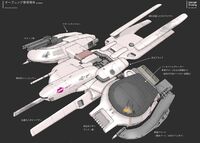 Infinite Space Growing up as a second class citizen on a back-water planet, Yuri dreamed of being able to travel the stars. After many years he saved up enough credits to buy transport off the planet, but space travel is forbidden to second class citizens, and he is chased by the security forces of the corrupt owner of the planet. To survive the dangers of space Yuri must become a captain, buy and customize star ships, and fight against hostile enemies both on the ground and in space.
Infinite Space Growing up as a second class citizen on a back-water planet, Yuri dreamed of being able to travel the stars. After many years he saved up enough credits to buy transport off the planet, but space travel is forbidden to second class citizens, and he is chased by the security forces of the corrupt owner of the planet. To survive the dangers of space Yuri must become a captain, buy and customize star ships, and fight against hostile enemies both on the ground and in space. -
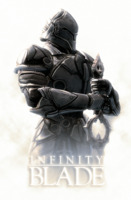 Infinity Blade Infinity Blade was an action role-playing game developed by Chair Entertainment and Epic Games and released through the Apple App Store on December 9, 2010. It was the first iOS video game to run on Unreal Engine 3. In the game, the unnamed player character fights a series of one-on-one battles in a derelict castle to face the immortal God King. When in battle, players swipe the screen to attack and parry, and tap the screen to dodge and block enemy attacks. Upon defeat, the player restarts the game as the character's descendant with the same items and experience level. The game was developed by a team of twelve people, who took two months to make a playable demo and three more to finish the game. Infinity Blade was intended to demonstrate the new iOS version of the Unreal Engine, and to combine the combat of Karateka and Prince of Persia with the loneliness of Shadow of the Colossus. The game received four free expansions that added new equipment, endings, and game modes. Infinity Blade was the fastest-grossing app in the history of iOS upon its release. It made US$1.6 million in its first four days, and over US$23 million by the end of 2011. It was well received by gaming critics. Reviews praised the graphics and compared the mobile game favorably to console games. Critics also praised the swipe-based combat system, but split opinions on the cyclical gameplay as either addictive or repetitive. Chair later released an arcade port and two sequels: Infinity Blade II and Infinity Blade III. Author Brandon Sanderson also wrote two novellas set between the games: Infinity Blade: Awakening and Infinity Blade: Redemption. The game, along with its two sequels, was removed from the App Store on December 10, 2018, due to difficulties in updating the game for newer hardware.
Infinity Blade Infinity Blade was an action role-playing game developed by Chair Entertainment and Epic Games and released through the Apple App Store on December 9, 2010. It was the first iOS video game to run on Unreal Engine 3. In the game, the unnamed player character fights a series of one-on-one battles in a derelict castle to face the immortal God King. When in battle, players swipe the screen to attack and parry, and tap the screen to dodge and block enemy attacks. Upon defeat, the player restarts the game as the character's descendant with the same items and experience level. The game was developed by a team of twelve people, who took two months to make a playable demo and three more to finish the game. Infinity Blade was intended to demonstrate the new iOS version of the Unreal Engine, and to combine the combat of Karateka and Prince of Persia with the loneliness of Shadow of the Colossus. The game received four free expansions that added new equipment, endings, and game modes. Infinity Blade was the fastest-grossing app in the history of iOS upon its release. It made US$1.6 million in its first four days, and over US$23 million by the end of 2011. It was well received by gaming critics. Reviews praised the graphics and compared the mobile game favorably to console games. Critics also praised the swipe-based combat system, but split opinions on the cyclical gameplay as either addictive or repetitive. Chair later released an arcade port and two sequels: Infinity Blade II and Infinity Blade III. Author Brandon Sanderson also wrote two novellas set between the games: Infinity Blade: Awakening and Infinity Blade: Redemption. The game, along with its two sequels, was removed from the App Store on December 10, 2018, due to difficulties in updating the game for newer hardware. -
 Infinity Blade II Infinity Blade II was an action role-playing video game for iOS developed by Chair Entertainment and Epic Games. The game was the sequel to Infinity Blade by the same developers. Infinity Blade II was announced on October 4, 2011, during the Apple iPhone 4S Presentation Keynote. It was subsequently released on December 1, 2011. The game featured enhanced graphics and a storyline continuing from the novel Infinity Blade: Awakening. A sequel, Infinity Blade III, was released on September 18, 2013. The game was removed from the App Store on December 10, 2018, alongside Infinity Blade and Infinity Blade III, due to difficulties in updating the game for newer hardware.
Infinity Blade II Infinity Blade II was an action role-playing video game for iOS developed by Chair Entertainment and Epic Games. The game was the sequel to Infinity Blade by the same developers. Infinity Blade II was announced on October 4, 2011, during the Apple iPhone 4S Presentation Keynote. It was subsequently released on December 1, 2011. The game featured enhanced graphics and a storyline continuing from the novel Infinity Blade: Awakening. A sequel, Infinity Blade III, was released on September 18, 2013. The game was removed from the App Store on December 10, 2018, alongside Infinity Blade and Infinity Blade III, due to difficulties in updating the game for newer hardware. -
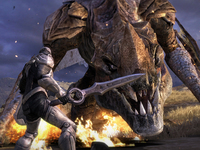 Infinity Blade III Infinity Blade III is an action role-playing game for iOS, developed by Chair Entertainment and Epic Games. It was the third game in the Infinity Blade series. It was released on the App Store on September 18, 2013. The game was removed from the App Store on December 10, 2018, alongside Infinity Blade and Infinity Blade II due to difficulties in updating the game for newer hardware, with no plans for re-release. This app is no longer downloadable on one's purchased history as of August 28, 2020 due to Apple having terminated Epic Games’ developer account on that date.
Infinity Blade III Infinity Blade III is an action role-playing game for iOS, developed by Chair Entertainment and Epic Games. It was the third game in the Infinity Blade series. It was released on the App Store on September 18, 2013. The game was removed from the App Store on December 10, 2018, alongside Infinity Blade and Infinity Blade II due to difficulties in updating the game for newer hardware, with no plans for re-release. This app is no longer downloadable on one's purchased history as of August 28, 2020 due to Apple having terminated Epic Games’ developer account on that date. -
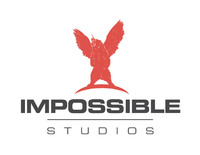 Infinity Blade: Dungeons Infinity Blade: Dungeons was a planned prequel to Infinity Blade I set in the award-winning Infinity Blade universe. It was to be released some time in 2013 exclusively for iOS devices. It was unveiled at GDC 2012 by Epic Games. The Infinity Blade: Dungeons project was put on an indefinite hold in 2013, after developer Impossible Studios was shut down in February, just six months after it was originally formed. Infinity Blade series co-creator Donald Mustard later confirmed the title had been canceled. Among the files leaked in the December 2023 TestFlight "Teraleak" were four prototype builds of Infinity Blade: Dungeons, which showed the game had reached an advanced state of development prior to its cancellation, including even voiced cutscenes.
Infinity Blade: Dungeons Infinity Blade: Dungeons was a planned prequel to Infinity Blade I set in the award-winning Infinity Blade universe. It was to be released some time in 2013 exclusively for iOS devices. It was unveiled at GDC 2012 by Epic Games. The Infinity Blade: Dungeons project was put on an indefinite hold in 2013, after developer Impossible Studios was shut down in February, just six months after it was originally formed. Infinity Blade series co-creator Donald Mustard later confirmed the title had been canceled. Among the files leaked in the December 2023 TestFlight "Teraleak" were four prototype builds of Infinity Blade: Dungeons, which showed the game had reached an advanced state of development prior to its cancellation, including even voiced cutscenes. -
 Ivy the Kiwi? Ivy the Kiwi? takes place in the Quiet Forest. One day, an egg falls from the sky, and from that egg Ivy hatches. After being born, Ivy discovers that her mama isn't there and begins her search for her mother.
Ivy the Kiwi? Ivy the Kiwi? takes place in the Quiet Forest. One day, an egg falls from the sky, and from that egg Ivy hatches. After being born, Ivy discovers that her mama isn't there and begins her search for her mother. -
 James Bond 007: Blood Stone James Bond 007: Blood Stone is a 2010 third-person shooter video game developed by Bizarre Creations and published by Activision for Microsoft Windows, Nintendo DS, PlayStation 3 and Xbox 360. It is the 24th game in the James Bond series and is the first game since James Bond 007: Everything or Nothing to have an original story, set between Quantum of Solace (2008) and Skyfall (2012). The game was confirmed by Activision on 16 July 2010 and was released on 2 November 2010 in North America and released on 5 November 2010 in Europe. Activision's remake of GoldenEye 007 was released on the same day respectively in each region. Blood Stone features the voices and likenesses of Daniel Craig, Judi Dench and Joss Stone.
James Bond 007: Blood Stone James Bond 007: Blood Stone is a 2010 third-person shooter video game developed by Bizarre Creations and published by Activision for Microsoft Windows, Nintendo DS, PlayStation 3 and Xbox 360. It is the 24th game in the James Bond series and is the first game since James Bond 007: Everything or Nothing to have an original story, set between Quantum of Solace (2008) and Skyfall (2012). The game was confirmed by Activision on 16 July 2010 and was released on 2 November 2010 in North America and released on 5 November 2010 in Europe. Activision's remake of GoldenEye 007 was released on the same day respectively in each region. Blood Stone features the voices and likenesses of Daniel Craig, Judi Dench and Joss Stone. -
 Jet Set Radio Jet Set Radio (originally released in North America as Jet Grind Radio) is a 2000 action game developed by Smilebit and published by Sega for the Dreamcast. The player controls a member of a youth gang, the GG's, as they use inline skates to traverse Tokyo, spraying graffiti, challenging rival gangs, and evading authorities. Development was headed by director Masayoshi Kikuchi, with art by Ryuta Ueda. The team drew influence from late 1990s Japanese popular culture such as the rhythm game PaRappa the Rapper, the anti-establishment themes in the film Fight Club, and 1980s American hip hop culture such as graffiti. The environments were based on Tokyo shopping districts in Shibuya and Shinjuku, with graffiti designed by artists including Eric Haze. Jet Set Radio was the first game to use a cel-shaded art style, developed in response to the team's disappointment with the abundance of sci-fi and fantasy Sega games. Jet Set Radio became universal acclaim for its graphics, soundtrack and gameplay. It is considered by critics to be one of the greatest video games of the 2000s, and one of the greatest video games of all time. It won several awards and was nominated for many others. A Game Boy Advance version, developed by Vicarious Visions, was released in 2003, along with versions for Japanese mobile phones. In 2012, Jet Set Radio was rereleased for the Xbox 360, PlayStation 3, iOS, Windows, PlayStation Vita and Android. A sequel, Jet Set Radio Future, was released for the Xbox in 2002. Sega announced a new Jet Set Radio game in 2023.
Jet Set Radio Jet Set Radio (originally released in North America as Jet Grind Radio) is a 2000 action game developed by Smilebit and published by Sega for the Dreamcast. The player controls a member of a youth gang, the GG's, as they use inline skates to traverse Tokyo, spraying graffiti, challenging rival gangs, and evading authorities. Development was headed by director Masayoshi Kikuchi, with art by Ryuta Ueda. The team drew influence from late 1990s Japanese popular culture such as the rhythm game PaRappa the Rapper, the anti-establishment themes in the film Fight Club, and 1980s American hip hop culture such as graffiti. The environments were based on Tokyo shopping districts in Shibuya and Shinjuku, with graffiti designed by artists including Eric Haze. Jet Set Radio was the first game to use a cel-shaded art style, developed in response to the team's disappointment with the abundance of sci-fi and fantasy Sega games. Jet Set Radio became universal acclaim for its graphics, soundtrack and gameplay. It is considered by critics to be one of the greatest video games of the 2000s, and one of the greatest video games of all time. It won several awards and was nominated for many others. A Game Boy Advance version, developed by Vicarious Visions, was released in 2003, along with versions for Japanese mobile phones. In 2012, Jet Set Radio was rereleased for the Xbox 360, PlayStation 3, iOS, Windows, PlayStation Vita and Android. A sequel, Jet Set Radio Future, was released for the Xbox in 2002. Sega announced a new Jet Set Radio game in 2023. -
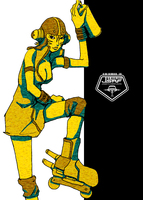 Jet Set Radio Future Jet Set Radio Future is a 2002 action game developed by Smilebit and published by Sega for the Xbox. The sequel to the Dreamcast game Jet Set Radio (2000), it features refined gameplay mechanics, updated graphics, larger open world environments, new characters, an altered plot, a new soundtrack and multiplayer gameplay. The player controls members of the youth street gang, the GG's, who use inline skates to traverse a futuristic Tokyo, spraying graffiti, challenging rival gangs and evading authorities. Like the original, Jet Set Radio Future uses cel-shaded visuals. Jet Set Radio Future was very well received by critics. It won several awards and was nominated for many others. It was released as an Xbox launch game in Japan and Europe, and later bundled with Xbox consoles along with Sega GT 2002.Jet Set Radio Future became backwards compatible on Xbox 360 in 2005. In 2023, Sega announced a sequel.
Jet Set Radio Future Jet Set Radio Future is a 2002 action game developed by Smilebit and published by Sega for the Xbox. The sequel to the Dreamcast game Jet Set Radio (2000), it features refined gameplay mechanics, updated graphics, larger open world environments, new characters, an altered plot, a new soundtrack and multiplayer gameplay. The player controls members of the youth street gang, the GG's, who use inline skates to traverse a futuristic Tokyo, spraying graffiti, challenging rival gangs and evading authorities. Like the original, Jet Set Radio Future uses cel-shaded visuals. Jet Set Radio Future was very well received by critics. It won several awards and was nominated for many others. It was released as an Xbox launch game in Japan and Europe, and later bundled with Xbox consoles along with Sega GT 2002.Jet Set Radio Future became backwards compatible on Xbox 360 in 2005. In 2023, Sega announced a sequel. -
 Katamari Forever Katamari Forever, known in Japan as Katamari Damacy Tribute, is a video game in the Katamari series. The game was released for the PlayStation 3 console in Japan on July 23, 2009, and in September for North America, Europe, and Australia.
Katamari Forever Katamari Forever, known in Japan as Katamari Damacy Tribute, is a video game in the Katamari series. The game was released for the PlayStation 3 console in Japan on July 23, 2009, and in September for North America, Europe, and Australia. -
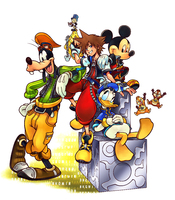 Kingdom Hearts: Re:coded Kingdom Hearts Re: Coded is a remake of Kingdom Hearts Coded that was released for Mobile, only in Japan. The game takes place after the events of Kingdom Hearts II, when Jiminy's Journal (where the events of Kingdom Hearts I & II are recorded) gets infested with bugs. In order to decode the information in the journal and debug it, King Mickey, Donald, Goofy and Jiminy Cricket digitalize it. With the help of a digital Sora, recreated from the Journal's code, they start exploring the Worlds in the journal to reveal what is missing.
Kingdom Hearts: Re:coded Kingdom Hearts Re: Coded is a remake of Kingdom Hearts Coded that was released for Mobile, only in Japan. The game takes place after the events of Kingdom Hearts II, when Jiminy's Journal (where the events of Kingdom Hearts I & II are recorded) gets infested with bugs. In order to decode the information in the journal and debug it, King Mickey, Donald, Goofy and Jiminy Cricket digitalize it. With the help of a digital Sora, recreated from the Journal's code, they start exploring the Worlds in the journal to reveal what is missing. -
 Kirby's Epic Yarn The plot of Kirby's Epic Yarn largely revolves around Nintendo's cutesy cream-puff being dragged out of his normal world by an evil sorcerer named Yin-Yarn and trapped in a fabric-based world called Patch Land. Everything in this new land, including the heroic marshmallow Kirby, is made of yarn and fabric. As a result, Kirby has lost his signature inhalation and power absorption abilities. After meeting and saving Fluff, a prince, Kirby and his companion decide to work together to "stitch-up" Patch Land in the wake of the destruction caused by Yin-Yarn.
Kirby's Epic Yarn The plot of Kirby's Epic Yarn largely revolves around Nintendo's cutesy cream-puff being dragged out of his normal world by an evil sorcerer named Yin-Yarn and trapped in a fabric-based world called Patch Land. Everything in this new land, including the heroic marshmallow Kirby, is made of yarn and fabric. As a result, Kirby has lost his signature inhalation and power absorption abilities. After meeting and saving Fluff, a prince, Kirby and his companion decide to work together to "stitch-up" Patch Land in the wake of the destruction caused by Yin-Yarn. -
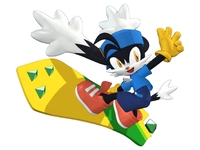 Klonoa (2008) Klonoa is a 2008 platform game developed by Paon and published by Namco Bandai Games for the Wii. It is a remake of Namco's 1997 PlayStation game Klonoa: Door to Phantomile, the first game in the Klonoa series, updating the game with fully 3D graphics, additional content, and gameplay changes. It was released in Japan in December 2008 and in North America and Europe in May 2009.
Klonoa (2008) Klonoa is a 2008 platform game developed by Paon and published by Namco Bandai Games for the Wii. It is a remake of Namco's 1997 PlayStation game Klonoa: Door to Phantomile, the first game in the Klonoa series, updating the game with fully 3D graphics, additional content, and gameplay changes. It was released in Japan in December 2008 and in North America and Europe in May 2009. -
 Klonoa Beach Volleyball Klonoa Beach Volleyball, known in Japan as Klonoa Beach Volley: Saikyō Team Ketteisen! (クロノアビーチバレー 最強チーム決定戦!, Kuronoa Bīchi Barē: Saikyō Chīmu Ketteisen!, "Klonoa Beach Volleyball: Strongest Team Playoff!"), is a 2002 sports video game developed and published by Namco for the PlayStation. It is a spin-off of the Klonoa game series, and has the distinction of being the last game Namco published for the PlayStation. Its release was limited to Japan and Europe, with the European release notably featuring the characters speaking in multiple languages, such as English, Spanish, French, Italian and German. This marks the first time the Klonoa series would include separate languages as options, which would not happen again until the release of Klonoa, the Wii remake of Klonoa: Door to Phantomile, years later. This is one of the only Klonoa titles to feature a multiplayer mode, allowing up to four players to compete in pairs against the other team using a multitap.
Klonoa Beach Volleyball Klonoa Beach Volleyball, known in Japan as Klonoa Beach Volley: Saikyō Team Ketteisen! (クロノアビーチバレー 最強チーム決定戦!, Kuronoa Bīchi Barē: Saikyō Chīmu Ketteisen!, "Klonoa Beach Volleyball: Strongest Team Playoff!"), is a 2002 sports video game developed and published by Namco for the PlayStation. It is a spin-off of the Klonoa game series, and has the distinction of being the last game Namco published for the PlayStation. Its release was limited to Japan and Europe, with the European release notably featuring the characters speaking in multiple languages, such as English, Spanish, French, Italian and German. This marks the first time the Klonoa series would include separate languages as options, which would not happen again until the release of Klonoa, the Wii remake of Klonoa: Door to Phantomile, years later. This is one of the only Klonoa titles to feature a multiplayer mode, allowing up to four players to compete in pairs against the other team using a multitap. -
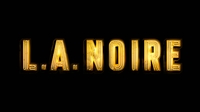 L.A. Noire L.A. Noire is a hard-boiled detective game set in Los Angeles of 1947. Drawing strongly from the stylistic film noir, players control LAPD officer Cole Phelps through 21 cases as he works his way through the ranks of his department to solve a series of murder mysteries. Each case forms an independent section in the game, but there is an overarching story with recurring characters and Phelps's personal history while serving during the Second World War. He starts off as a patrolman, but eventually advances to a traffic detective, homicide, vice, and finally arson investigator. With each promotion, a new partner and new locations become available.
L.A. Noire L.A. Noire is a hard-boiled detective game set in Los Angeles of 1947. Drawing strongly from the stylistic film noir, players control LAPD officer Cole Phelps through 21 cases as he works his way through the ranks of his department to solve a series of murder mysteries. Each case forms an independent section in the game, but there is an overarching story with recurring characters and Phelps's personal history while serving during the Second World War. He starts off as a patrolman, but eventually advances to a traffic detective, homicide, vice, and finally arson investigator. With each promotion, a new partner and new locations become available. -
 Legacy of Kain: Dead Sun Legacy of Kain: Dead Sun is a cancelled action-adventure video game that was in development by Climax Studios for Square Enix Europe, with an accompanying multiplayer component developed separately by Psyonix. Conceived as the sixth entry in the Legacy of Kain series.
Legacy of Kain: Dead Sun Legacy of Kain: Dead Sun is a cancelled action-adventure video game that was in development by Climax Studios for Square Enix Europe, with an accompanying multiplayer component developed separately by Psyonix. Conceived as the sixth entry in the Legacy of Kain series. -
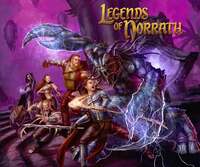 Legends of Norrath: Against The Void Against the Void takes the epic story of the previous release, Ethernauts, into compelling new territory while also adding more than 280 new gameplay cards, 16 new loot cards for both EverQuest® and EverQuest® II, two new playable avatar races and 10 brand-new scenarios.
Legends of Norrath: Against The Void Against the Void takes the epic story of the previous release, Ethernauts, into compelling new territory while also adding more than 280 new gameplay cards, 16 new loot cards for both EverQuest® and EverQuest® II, two new playable avatar races and 10 brand-new scenarios. -
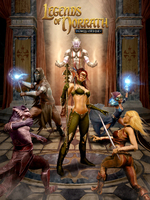 Legends of Norrath: Inquisitor Inquisitor continues the story from previous Legends of Norrath virtual card games, Oathbound and Forsworn, with hundreds of new cards and more than 20 new loot items each for EQ and EQII.
Legends of Norrath: Inquisitor Inquisitor continues the story from previous Legends of Norrath virtual card games, Oathbound and Forsworn, with hundreds of new cards and more than 20 new loot items each for EQ and EQII. -
 Lego Universe Lego Universe is a massively multiplayer online game that was available from October 2010 to January 2012.
Lego Universe Lego Universe is a massively multiplayer online game that was available from October 2010 to January 2012. -
 Let's Tap Let's Tap is a video game developed by Yuji Naka's studio Prope and published by Sega for the Wii console. Along with Let's Catch, Let's Tap was the first game from Prope to be announced. Owners of Let's Tap can unlock content in Let's Catch. The game was later released as five individual applications for iOS.
Let's Tap Let's Tap is a video game developed by Yuji Naka's studio Prope and published by Sega for the Wii console. Along with Let's Catch, Let's Tap was the first game from Prope to be announced. Owners of Let's Tap can unlock content in Let's Catch. The game was later released as five individual applications for iOS. -
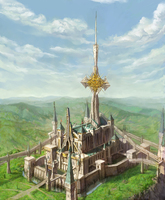 Lineage II: The Chaotic Chronicle Lineage II is a Massively Multiplayer Online Role Playing game with a fantasy setting. It has fully 3D game play, with the ability to play several class types. One of the biggest features is the ability to form clans and siege castles.
Lineage II: The Chaotic Chronicle Lineage II is a Massively Multiplayer Online Role Playing game with a fantasy setting. It has fully 3D game play, with the ability to play several class types. One of the biggest features is the ability to form clans and siege castles. -
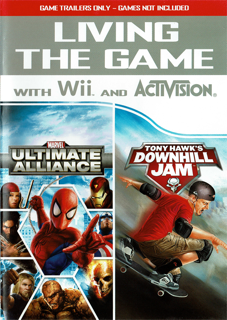 Living the Game with Wii and Activision Promotional DVD produced by Activision to promote two of their Nintendo Wii launch titles. Potentially distributed at Target stores. Contains videos and screenshots promoting Marvel: Ultimate Alliance and Tony Hawk's Downhill Jam for Nintendo Wii. Videos: Marvel Ultimate Alliance: Wii Trailer Marvel Ultimate Alliance: Behind the Scenes Tony Hawk's Downhill Jam: E3 Trailer Tony Hawk's Downhill Jam: Behind the Scenes Tony Hawk's Downhill Jam: Ways to Win: Studio Tony Hawk's Downhill Jam: Ways to Win: Locations Screenshots: Marvel Ultimate Alliance (8 images) Disc has been dumped to Redump specifications using MPF. Due to this item having been provided as a free promotion, Hit Save has made the video files available on our archive in a compressed format. Uncompressed MKV file rips remain on record. If you are a video game history researcher and would like access to the physical item or the raw files, please contact us. Such requests are approved on a case by case basis at the discretion of the director. Further Reading:
Living the Game with Wii and Activision Promotional DVD produced by Activision to promote two of their Nintendo Wii launch titles. Potentially distributed at Target stores. Contains videos and screenshots promoting Marvel: Ultimate Alliance and Tony Hawk's Downhill Jam for Nintendo Wii. Videos: Marvel Ultimate Alliance: Wii Trailer Marvel Ultimate Alliance: Behind the Scenes Tony Hawk's Downhill Jam: E3 Trailer Tony Hawk's Downhill Jam: Behind the Scenes Tony Hawk's Downhill Jam: Ways to Win: Studio Tony Hawk's Downhill Jam: Ways to Win: Locations Screenshots: Marvel Ultimate Alliance (8 images) Disc has been dumped to Redump specifications using MPF. Due to this item having been provided as a free promotion, Hit Save has made the video files available on our archive in a compressed format. Uncompressed MKV file rips remain on record. If you are a video game history researcher and would like access to the physical item or the raw files, please contact us. Such requests are approved on a case by case basis at the discretion of the director. Further Reading: -
 Lumines: Electronic Symphony Lumines: Electronic Symphony is a game developed by Q Entertainment and published by Ubisoft for the PlayStation Vita.
Lumines: Electronic Symphony Lumines: Electronic Symphony is a game developed by Q Entertainment and published by Ubisoft for the PlayStation Vita. -
 Magicka Magicka is a satirical action-adventure game set in a rich fantasy world based on Norse mythology. The player assumes the role of a wizard from a sacred order tasked with stopping an evil sorcerer who has thrown the world into turmoil, his foul creations besieging the forces of good.
Magicka Magicka is a satirical action-adventure game set in a rich fantasy world based on Norse mythology. The player assumes the role of a wizard from a sacred order tasked with stopping an evil sorcerer who has thrown the world into turmoil, his foul creations besieging the forces of good.